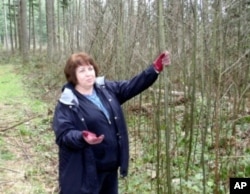The local food movement is growing in the United States. Restaurant owners and families look to nearby farms for fruits, vegetables and meat. Now small forest owners want to join the local food party. They're promoting edible mushrooms, berries, and salad greens that flourish in the woods.
Carol Wick and her husband own a small slice of the American dream, 12 hectares at the edge of the Cascade foothills, southeast of Seattle, Washington. A short walk from her doorstop, past some pastures and a dilapidated barn, is the fir and cedar forest that covers about one-third of her property.
"Our object is not to turn this into a harvestable timber farm, but to do something else with it," says Wick, who wants her beloved forest to generate supplemental income from any number of edible delicacies. "It just kind of lends itself to have a U-pick in the forest."
The Wicks have planted gourmet mushrooms and native berry bushes. She ticks off a long list of forest produce she could potentially sell.
"Wild blueberries, huckleberries, the wild raspberry, wild blackberries. Some of the forest native vegetables that you might have, like miner's lettuce for instance, purslane. Those are not that hard to harvest and they taste good."
The Cascade Harvest Coalition is a nonprofit in Washington state, dedicated to localizing food production. Its director, Mary Embleton, won a small grant to explore how to expand the 'eat local' movement to include small forest landowners.
"It's, I think, a very natural progression to start to expand this type of programming and consumer education to a broader set of working lands," says Embleton, who wants to play matchmaker between suppliers and markets.
She had a good turnout at an initial information meeting to present the idea to small woodlot owners. An expert panel talked dollars and cents. They said wild mushrooms can fetch $24 to $40 per kilo. A kilo of huckleberries can net $16 in the restaurant trade. Chefs also are showing an appetite for fiddlehead ferns.
One potential buyer is Tony D'Onofrio, who works for a chain of local grocery stores.
"I love this idea of forest-to-table because there is more to the forest land than just harvesting timber," he says. "If you can harvest sustainably year after year some product that ends up on the table, it means the forest stays intact."
But he also offers a reality check. Size matters. To be efficient, even a modest chain like his needs greater volumes and scale than a small forest can generate.
"A grocery store needs to have a product available for a consistent length of time, let's say throughout the chanterelle season. You want the chanterelles there and you always want the bins full because your customers expect them," says D'Onofrio.
He suggests that farmers markets might be the best outlet for forest bounty foraged on smaller scales.
Professional forester Kirk Hansen consults with small woodlot owners. He says another strategy might be to connect a landowner directly with one specialty shop operating on a similarly small scale.
"You know, what we're talking is boutique harvesting and sales. So if somebody has twenty acres [8 hectares] you can only expect to harvest so much sustainably off of that," he says. "So if it is a floral green like salal or sword fern you may only be harvesting a few pounds of that every year off your property."
A Seattle-based company called Foraged & Found has made a full-time business out of combing public and private timberlands in the Pacific Northwest for edible delicacies. The company's pickers forage very large parcels for seasonal bounty to sell to gourmet restaurants.
Governments are also giving the trend a nudge. A U.S. Department of Agriculture grant is helping a Portland, Oregon nonprofit research and promote the most viable non-timber products produced by family forests. And in Asheville, North Carolina, the county tourism board promotes food adventures by giving families directions for berry picking, mushroom gathering and harvesting wild leeks in the forest.




